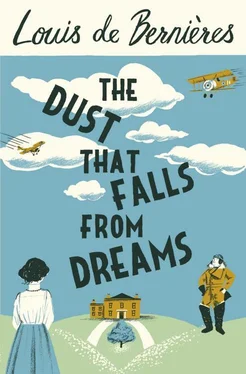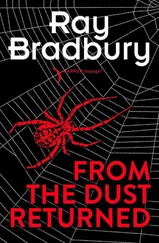‘ C’est vrai ,’ said the pilot. ‘ Mais quand même …’
‘ Elle est la dernière? ’
‘ Peut-être .’
‘ Alors, elle est un trésor. Il faut la preserver . We said it might be the last one left, and ought to be preserved.’
‘Wouldn’t mind it as a run-about,’ says the Major.
One of the prisoners gestures towards Daniel’s Camel. ‘ Cet avion … le Camel … il est absolument incroyable … il est là, il n’est pas là … qu’est-ce qu’on peut faire contre un avion comme ça? ’
‘ En anglais on dit “split-arse ”,’ says Daniel.
Major Beckenham-Gilbert understands that they are talking about the Camel, and interjects, ‘Damned bloody split-arse.’
‘Damt blutti split-haus,’ repeats the German pilot.
‘ Qu’est-ce qui se passe maintenant? ’ asks the observer. His face is pale and worried.
‘ Vous êtes tous les deux prisonniers, naturellement. Demain vous partez, mais ce soir vous dînez au mess avec nous. Je dois vous avertir qu’à la fin du repas, nous nous levons pour porter un toast au roi. Vous ne devez pas porter le toast, mais vous devez vous mettre debout. Compris? ’
They nod, and their faces light up at the thought of a meal. They have heard that the British have plenty of meat. Daniel offers them cigarettes. Camels, courtesy of the Americans. The two Germans look at the packet and smile. Daniel gives them the entire packet. He says to the Major, ‘I told them they could dine with us tonight, and they’d have to stand up for the loyal toast, but wouldn’t have to drink.’
‘Seems a shame not to drink. Mind you, I wouldn’t toast the Kaiser. Well, I might do so, but I’d take the opportunity to wish him a stiff case of haemorrhoids.’
‘ Pour vous la guerre est finie ,’ says Daniel to the two captives.
‘ Finie ,’ they nod, wondering what emotion to feel. They have a sense of let-down, anticlimax, relief, fear of the future, extreme weariness permitted at last. They feel a bond of affection and gratitude for this British airman who has changed their lives by making the future possible, and who seems simultaneously to be French.
‘ Si vous avez besoin de quelque chose, avertissez-moi dès que possible, d’accord? Je vous donnerai le numéro de téléphone ici, et j’écrirai une lettre comme espèce de renseignement. Je vous donnerai aussi l’addresse de ma mère. Après la guerre, si je suis toujours vivant, on va se rencontrer et dîner ensemble. Je vous invite. ’
The pilot is touched. He says sincerely, ‘ J’espère que vous survivrez. Dieu vous prête la vie. Je vous remercie de nous avoir épargnés. Je vous souhaite le bonheur et prospérité et des jolis enfants .’
‘ Et moi aussi ,’ adds the observer. ‘ Nous vous devons la vie. ’
‘I told them to keep in touch,’ says Daniel. ‘They thanked me for sparing them, and wished me lots of pretty children.’
‘Seem like a decent pair of fellows,’ says Major Maurice Beckenham-Gilbert. ‘Now I come to think of it, I think that they might be the two blighters who nearly shot my rudder off, over Arras.’
MILLICENT WAS STANDING on a chair dusting the frame of the portrait of Mr McCosh’s grandfather with a feather duster, when the telephone rang. ‘Oh bother!’ she exclaimed, and hopped down. She ran to the apparatus and lifted the earpiece off the hook. She put on the most aristocratic voice she could manage, and recited the words that Mrs McCosh had once made her repeat fifty times, until she had got it quite right: ‘Eltham 292. The Grampians. Millicent speaking. To whom would you like to speak?’
‘Ah, Millicent,’ said a warm voice from east London. ‘You don’t ’alf sound posh. It’s you I’m after, as a matter of fact.’
‘Who is it? Is that you, Hutch?’
‘What if it wasn’t? How many boyfriends have you got, my girl?’
‘About fifteen, but only four is serious. Where are you? Are you home?’
‘I’m home. I’ve got two weeks. When are you off?’
‘After church. On Sunday.’
‘Can I come and see you? I want to ask you to marry me.’
‘What?’
‘You heard.’
‘Hutch! You can’t just ask me on the phone! All casual!’
‘I haven’t. I’m going to ask you on Sunday. We’ll go down to the Tarn.’
‘You won’t find a dry place to kneel.’
‘Stuff that, sweetheart. I’ve been sodden for years. But I’m not going to ask if you’re not going to be accepting.’
‘Oh, Hutch! Well, what do you think?!’
‘Is that yes, then?’
‘Oh, Hutch!’
The telephone began to bleep, and in the few seconds left, Hutch said, ‘Got no more pennies. See you Sunday, sweetheart.’
Millicent sat down on the chair beneath the portrait that she had been dusting, and blew out her cheeks. She felt the most wonderful sense of jubilation, and began to laugh. Rosie came out of the drawing room and found her there, apparently idling, and Millicent sprang to her feet in embarrassment. ‘Oh, Miss Rosie, I wasn’t slacking. I wasn’t, I promise!’ Rosie looked a little sceptical. ‘I wasn’t, miss! I was recovering! I just had news!’
‘Happy news, by the looks of it.’
‘I’m going to get married, miss! Hutch is coming on Sunday, and he’s going to ask me. Down by the Tarn.’
Rosie stood silent for a second or two, absorbing the news.
‘Why are you crying, miss?’
‘Oh Millicent, I’m so happy for you. I’m sorry. I can’t help it. It’s such wonderful news.’
Millicent realised at that moment that Rosie was perhaps also crying for herself. She reached up her hands helplessly, as if to embrace Rosie, but knowing that it could not possibly be done. Rosie saw the gesture and reacted naturally to it. She reached out her own hands and the two women found themselves in each other’s arms, both in tears.
Eventually Rosie detached herself, wiped her eyes with the exiguous handkerchief that she kept up her sleeve, and said, ‘I bet that’s never happened in this house before.’
‘Nor never will again, most like.’
‘Millicent?’
‘Yes, miss?’
‘Can I be your bridesmaid? For Ash’s sake? Because Hutchinson was his best friend?’
Millicent was horrified, and flushed hotly. ‘But, miss, no gentlewoman has ever been no servant’s bridesmaid. What’ll Mrs McCosh say?’
‘Everything’s changed, Millicent. Before the war Ash and Hutchinson wouldn’t have got to be friends, would they? And there’s absolutely no need for my mother to know. I’ll go as the family representative. If you accept, of course.’
‘But, miss, I got four sisters.’
At last Rosie perceived Millicent’s agitation, and felt ashamed of herself.
‘Oh, Millicent, I am sorry. I didn’t mean to put you on the spot. It was thoughtless of me. It’s just that I’m fond of you. And I’m really not a snob any more. But I can quite see that it would seem awfully strange for your family if I were there. I am sorry. I shouldn’t have asked.’
‘It was nice of you to ask,’ said Millicent. ‘I don’t honestly think we’ll have any bridesmaids at all, though.’
‘May I come to the service? I’ll sit at the back, if that’s all right.’
‘Course it is, miss.’
‘Thank you.’
ONE OF THE nurses in Rosie’s tent had bought an autograph book and was filling it with inscriptions by the wounded soldiers in her care. The fashion had caught on because the men loved having something to do, and for many it was a chance to show how grateful they were to the nurses, to make up rhymes that lurched to scan, often didn’t rhyme very well either, and even to make oblique declarations of affection. Rosie went into Southampton and bought a very nice one at the stationer’s. It was bound in soft black leather, and the paper was thick and watermarked. Rosie had wanted a book of high quality in order to demonstrate to the men how much she valued them.
Читать дальше












